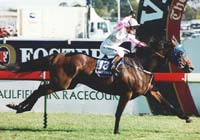Turf Heroes: Might And Power
As part of our excitement about the Sydney and especially Melbourne Spring Racing Carnivals and all that they entail, Making The Nut is pleased to bring you a ten-part ‘Turf Heroes’ series, where Cliff Bingham will look back fondly upon the great memories these champions thoroughbreds embedded in his mind. Part six of the series recaps the career of the first horse since Rising Fast to capture a Caulfield Cup, a Melbourne Cup and a Cox Plate – Might And Power.
Previous “Turf Heroes” Instalments
Part 1: Super Impose
Part 2: Better Loosen Up
Part 3: Let’s Elope
Part 4: Octagonal
Part 5: Saintly
The career
Much as with all of our “Turf Heroes” to date bar Octagonal, Might And Power’s career began with little indication of what was in store.
His winter two year-old campaign entailed two unplaced runs before a win on the Randwick ‘inner track’ (these days referred to as the Kensington track) and a second placing two days after he notionally became a three year-old on August 1.
He was not seen again until December of 1996 before embarking on a three year-old campaign throughout the summer and autumn. Consecutive wins in restricted grade during February saw him tested in Group company for the first time. He ran second to Intergaze in the Group 1 Canterbury Guineas, seventh to Tarnpir Lane in the Group 1 Rosehill Guineas and fourth to Ebony Grosve in the Group 1 AJC Derby, before dropping back in grade and taking out the Group 3 Frank Packer Plate.
The first signs that he had the ‘made the leap’ to elite company came with his first run of the 1997 spring, where he took on (and beat) the sprinters in the Listed Show County Quality. He then ran second twice at Group 3 level before finishing eighth behind Iron Horse in the Group 1 Epsom Handicap.
His career record as he headed to Melbourne for the remainder of the spring stood at 16 starts for five wins, one at Group level – a more than respectable return, but not one that had him earmarked as a future champion. That’s the thing about the Zabeel progeny though – as a rule, you never want to be too quick to judge, as they often advance substantially as four year-olds and in particular when they take on the staying caper.
Might And Power turned for home in the 1997 Caulfield Cup in the lead, having stolen something of a march on the chasing pack. A 17 year-old at the time, I had used some legally-aged junior golfing connections to get something each way thrown onto my old pal Doriemus and quietly slipped inside the doorway of the local TAB outlet to watch the race. As Doriemus started to round up the thoroughbred equivalent of the peloton, I looked ahead expecting Might And Power to be tiring. No such luck. Might And Power turned the Caulfield Cup into an absolute clinic, winning by seven and a half lengths and breaking the track record for good measure.
He was slugged with a 3.5 kilo penalty for the Melbourne Cup, the biggest of the modern era. I thought it too much for an unproven two-miler and coupled with his short quote, found sufficient reason to stick with Doriemus at Flemington. What followed was one of the all-time great Melbourne Cups.
Might And Power led the field up, trying to do it at both ends with 56 kilos on board while Doriemus settled back in the field. Might And Power once again tried to spreadeagle the field early in the home straight, only this time he couldn’t break their spirits so easily. Nonetheless, he had held off all challengers until Doriemus launched at him late with such a burst that Greg Hall famously punched the air after passing in the post in the belief that he’d won. Jim Cassidy was equally confident that the leader had held on. The judge’s photo was called for – Might And Power had won by the barest of margins in an instant classic.
As with many a progressive type before him, the weight-for-age schedule of autumn races beckoned in 1998. He began his preparation with placings in the Group 1 Orr Stakes, Group 2 St George Stakes and Group 1 Ranvet Stakes. As with his spring 1997 campaign though, the best was yet to come with four emphatic victories.
He won the Group 1 Mercedes Classic by five lengths, the Group 1 Queen Elizabeth Stakes by an incredible ten lengths, the Group 2 Hollindale Cup by six lengths and the Group 1 Doomben Cup by just over a length in course record time. He had certainly assumed the mantle as the best staying horse in the country, and quite possibly become the best horse outright.
The spring of 1998 kicked off with a fourth placing on a rain affected track in the Group 2 Apollo Stakes before a win in the Group 2 Chelmsford Stakes and an inexplicable failure in the Group 1 George Main Stakes. As with his two previous preparations though, he lifted a gear over the longer journeys, recording easy wins in both the Group 1 Yalumba Stakes and Group 1 Cox Plate, the latter in track record time. It’s rare that the phrases ‘easy win’ and ‘Cox Plate’ can readily co-exist, but in 1998 it was apt.
The exclamation point on his campaign came in the Group 2 Queen’s Cup at Flemington, where he treated the field and the 60 kilo impost with contempt en route to a seven length victory as a prohibitively short priced favourite.
Sadly, this was the last we would see of ‘vintage’ Might And Power. A bowed tendon saw him off the scene for almost two full years, and after two disappointing runs as a seven year-old in the spring of 2000 the champion was retired.
The memories
Might And Power was not the prettiest of horses, nor the most graceful runner. Rather, he pounded the turf in stride – legs flailing everywhere with his head up in the air. It was one of the most unorthodox running styles ever exhibited by a champion galloper. The best sporting parallel I can think of here is golfer Jim Furyk – watch him swing a club for the first time and you’d dismiss as a hacker, yet he has a US Open and a Fed Ex Cup both sitting on his mantelpiece.
Moreover, Might And Power’s style of racing was rather unique. He was a front runner, but not in the manner that Vo Rogue or Stylish Century were front runners. The latter two would establish a substantial lead midrace and hope to hold on in the home straight, whereas Might And Power would typically assume the lead but only build up the pressure incrementally. It was often between the 800-metre and 400-metre marks that his quickening of the tempo saw the chasing pack ‘off the bit’ and struggling to keep pace.
How could a horse with such an ungainly running style win the best races in the land whilst doing the hard work at both ends? Much of this can be traced back to his seemingly boundless energy. Even after his Melbourne Cup win, he came back to the yard after the race somewhat feisty and coiled up, as if he could go around again in ten minutes time.
He became the first horse since Rising Fast to capture each of the Caulfield Cup, the Melbourne Cup and the Cox Plate. No horse has been able to replicate this treble since.
Much as was the case with Octagonal in the years before him, Might And Power’s success brought his owner into the public spotlight.
In the same way that the public had shown an affinity for the “chicken men” Jack and Bob Ingham, they now fell for Sydney fruit and veg merchant Nick Moraitis, and he in turn loved them back. While trainer Jack Denham was a man of few words, Moraitis was the public face of Might And Power’s racing campaigns and to some extent the sport of racing more broadly.
Might And Power was never one of mine – I took him on twice with Doriemus twice in the 1997 spring and then watched him go around at odds far too short for my liking throughout 1998. Nonetheless, breaking up his career record by distance (as per below) is pretty instructive in demonstrating just how good he was as the journeys got a little longer:
Career records at 1600 metres and shorter: 15 starts, three wins (1 x Group 2), three seconds, one third
Career record beyond 1600 metres: 18 starts, 12 wins (6 x Group 1s, 2 x Group 2s, 1 x Group 3), four seconds
Might And Power was one of the truly great stayers (and indeed great horses) of the modern era, as well as another of life’s lessons about never judging a book by its cover.
Score a $100 Free Bet from Luxbet!
The stats
Overall record: 33 starts, 15 wins (7 x Group 1s, 3 x Group 2s, 1 x Group 3), seven seconds, one third, $5,226,286 prize money
2YO/ 3YO winter (1996): Four starts, one win, one second
3YO summer/ autumn (1996-97): Eight starts, three wins (1 x G3), two seconds
4YO spring/ summer (1997-98): Six starts, three wins (2 x G1), three seconds
4YO autumn/ winter (1998): Seven starts, four wins (3 x G1, 1 x G2), two seconds, one third
5YO spring/ summer (1998-99): Six starts, four wins (2 x G1, 2 x G2)
7YO spring/ summer (2000-01): Two starts

